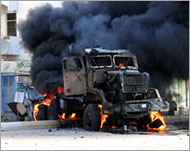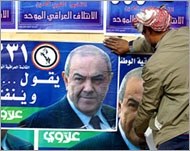Iraq polls hinge on Sunni participation
Who do we vote for? asks Abu Ghazi, 65, as he looks up at the hundreds of campaign posters outside the Hathra mosque in Falluja.

“They all say they’re anti-sectarian and insist on unity of the country. And they all give wonderful promises to Iraqis to open the gates of paradise for them early next year,” he said disapprovingly.
Abu Ghazi, a Sunni, may have sounded off one of the growing realities in the new Iraq – many seem to have lost faith in their politicians.
In the lead-up to elections last year, Iraqis were promised improved security, anti-corruption measures, electricity, clean water and reconstruction of decimated infrastructure.
In the past few weeks, Iraqi media has run similar election promises for the 15 December elections.
Violence fears
Many Iraqi analysts agree that violence significantly increased in 2005.
It is a topic you cannot escape anywhere in Iraq. It is commonly discussed at cafes, restaurants, family gatherings and on the television screens; whether from local channels of the fathaiyat – Arab satellite networks.
 |
|
Iraqi analysts agree violence |
The recent discovery of secret prison camps where Iraqi detainees, many of them Sunni, were tortured and killed has also increased public fear that there may be complete collapse of security in the country.
“With everybody armed and multinational forces losing control, civil war is so close,” said Saad al-Obaidi from the Front for National Dialogue political party.
“All we can do now is vote for those who do not believe in military solutions to the security dilemma.”
The instability gripping the country is leading to direct challenges to the religious authority as well, something unheard of in recent years.
“Islam is the solution,” said an Islamist politician after last week’s Friday prayers at Al-Shawi Mosque in Baghdad. “We have experienced everything else and failed.”
But a man in the congregation shouted back: “But our present government is religious and look what’s going on”.
An argument quickly ensued, with many deeply divided on the role Islamic governance should take in Iraq.
Boycott ‘lite’
The last round of elections was marred by overwhelming boycott by the Sunni Arab population of Iraq. Some Shia, Turkmen and Christians also boycotted.
On Thursday, however, Sunni Arab participation is expected to swell the number of voters.
Secretary-General of Association of Muslim Scholars Harith al-Dhari, recently said his organisation would not participate in the elections but stopped short of calling for nationwide boycott.
“We leave people to their own choices.”
Other Sunni parties and movements such as the Iraqi Islamic Party are fighting hard for a heavy Sunni participation in order to avoid socio-political marginalisation.
“Although we face assassinations and arrests, we will still go on with our campaign,” Salman al-Jumaily, whose name is on the 618 list that represents The Islamic Party and other Sunni allies, told Aljazeera.net.
Fraud allegations
Iraqis are also wary of the possibility of fraud.
In the referendum in October, Sunni politicians alleged ballot fraud in the northern province of Ninevah (Mosul). The Iraqi electoral commission admitted irregularities and conducted a recount.
|
“We leave people to their own choices” Harith al-Dhari, |
Muhammad al-Hamdani, chief of the Scientific & Cultural Forum in Falluja, says many Sunnis believe that Anbar province, which has seen most of the fighting in Iraq, is the target of a fraud conspiracy.
He points to the recent replacement of local election staff with personnel from outside the province.
Al-Hamdani called on international observers to monitor the results in the Anbar province.
Alleged fraud has also been one of the campaign’s controversial issues for politicians running for the post of prime minister.
In the many television adverts which pepper local stations’ programmes, former interim prime minister Iyad Allawi accused the Shia cleric Abd al-Aziz al-Hakim of corruption and abuse of power.
Mosul vote
In recent weeks, there has been much pressure on maximum Sunni participation at the polls. The momentum for US rapprochement with Sunni factions, many of whom are pro-resistance, began with Secretary of State Condoleezza Rice’s trip to Mosul last month.
“I think that the remarkable thing is that there is such high activity among the Sunni population,” she said.
Since her 11 November visit, the level of violence has come down in the city. And efforts to increase police presence have also increased.
The city’s administration opened a new police station on the left bank of the Tigris, a move many believe is a result of agreement between opposing factions to fully restore order to the city.
And Iraqi police in Mosul have begun to more aggressively engage unidentified armed groups, some thought to be merely criminal gangs.
Talal Ghanem, a professor of fine arts, told Aljazeera.net how he witnessed a gun battle between police and an armed gang in the Bakr district of the city on 22 November.
“The criminals were overwhelmed by the police and escaped. No one was hurt in the battle,” he said.
The increased level of security has encouraged many Sunnis to participate in the elections.
“I am voting for Mutlaq (Salih al-Mutlaq) and his Iraqi Front for National Dialogue because they want to keep the country secure and united,” said Abu Salah, 49, a small grocery shop owner.
Fierce competition
Competitive campaigning has been fierce in the weeks leading up to the elections.
Several Sunni politicians from different parties have been killed and campaign volunteers putting up posters have been attacked.
Allawi’s party has come under a lot of pressure as its workers have been attacked in areas traditionally sympathetic to the marjaiyah (Shia clerical order).
 |
|
Allawi’s party has come under |
While some political analysts believe Allawi to be a front-runner, he has come under heavy criticism from Sunni factions for his role and support of the US-led assault on Falluja in October 2004.
Nevertheless, his former Baathist background and rumoured deals to bring back some Baathists to positions of influence have made him the dark horse of the polls.
The Shia-based electoral list 555 is also a strong contender. It has received implicit backing from Ayat Allah Ali al-Sistani, Iraq’s leading Shia cleric.
If previous elections are any indication, it will be a few weeks before final official results are announced.
Iraqis will likely welcome the New Year with the first four-year government elected to power since the March 2003 invasion.